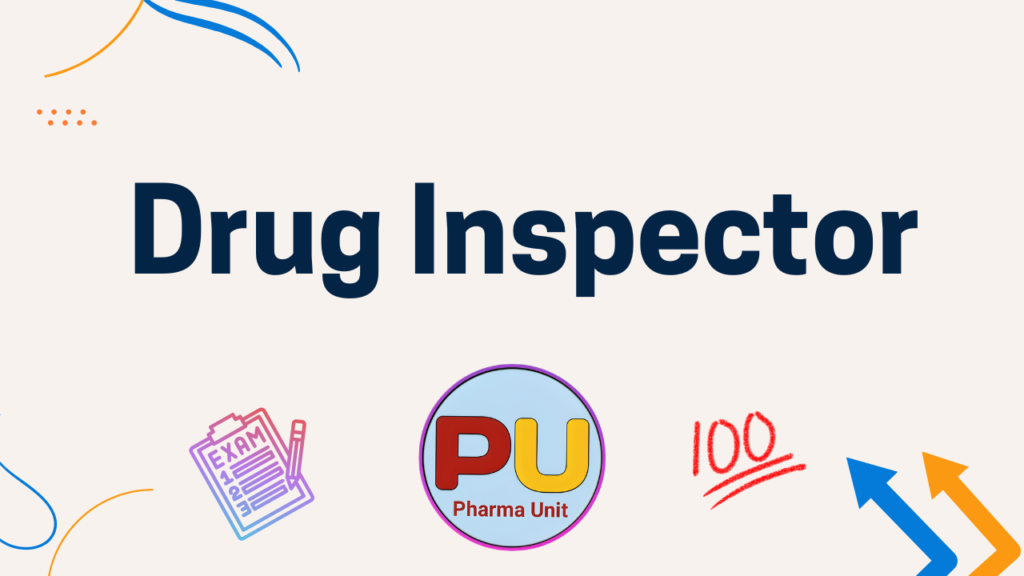If you are a pharmacy student or a recent graduate aiming for a respected government job, the post of Drug Inspector is one of the most sought-after career options. It is not just a government designation, it is a position of authority and responsibility directly linked to public health.

✅ Who is a Drug Inspector?
A Drug Inspector is a government-appointed officer responsible for enforcing the provisions of the Drugs and Cosmetics Act, 1940. Their primary duty is to regulate the manufacture, sale, and distribution of drugs and cosmetics in India.
In simple terms, a Drug Inspector ensures that medicines reaching patients meet legal standards of quality, strength, labelling, and safety. They act as the link between pharmaceutical manufacturers, sellers, and regulatory authorities, protecting the public from substandard or counterfeit drugs.
🎯 Key Responsibilities of a Drug Inspector
The role of a Drug Inspector is practical, field-oriented, and legally significant. They regularly inspect pharmaceutical manufacturing units, wholesale dealers, and retail pharmacies to ensure compliance with Good Manufacturing Practices and drug laws. During inspections, they verify licenses, storage conditions, records, and documentation.
Drug Inspectors also collect drug samples from the market for laboratory testing to confirm quality standards. In cases involving spurious, misbranded, or substandard drugs, they conduct investigations, seize products, and initiate legal action against offenders. Monitoring proper labelling, packaging, and expiry details is another essential responsibility, as errors here can directly affect patient safety.
📚 Eligibility Criteria to Become a Drug Inspector
To be eligible for the Drug Inspector post in India, candidates must meet specific educational and experience requirements. A degree in Pharmacy, Pharmaceutical Sciences, or Medicine with specialization in Clinical Pharmacology or Microbiology from a recognized university is mandatory.
In addition to education, most recruiting bodies require practical experience ranging from 18 months to 3 years in drug manufacturing, testing, or analysis. The exact experience criteria may vary depending on the recruiting authority or state service commission.
📝 Selection Process
Recruitment for Drug Inspectors is conducted through UPSC or State Public Service Commissions. The selection process generally begins with a written examination that tests pharmaceutical subjects, drug laws, regulatory affairs, and general knowledge.
Candidates who qualify in the written exam are called for an interview or personality test. This stage evaluates subject clarity, legal understanding, decision-making ability, and suitability for regulatory responsibility.
💼 Job Opportunities After Selection
Once appointed, Drug Inspectors are posted in various government regulatory bodies. Major employers include the Central Drugs Standard Control Organization (CDSCO), State Drug Control Departments, and the Ministry of Health and Family Welfare.
With experience, Drug Inspectors may also move into regulatory consultancy roles or international regulatory agencies, although the primary career path remains within government service.
💸 Salary and Perks of a Drug Inspector
The salary of a Drug Inspector is attractive and steadily increases with experience. Freshers usually earn between ₹50,000 and ₹60,000 per month. With 3–5 years of service, the salary can rise to ₹70,000–₹90,000 per month. Senior officers may earn ₹1,00,000 or more per month.
Apart from basic pay, Drug Inspectors receive government allowances such as DA, HRA, travel allowances, and job security benefits. Pension schemes and retirement benefits add to the long-term financial stability of the role.
📈 Career Growth and Promotions
Career progression in this field is well-defined. With experience and departmental examinations, Drug Inspectors can be promoted to Senior Drug Inspector, Assistant Drug Controller, Deputy Drug Controller, and eventually Drug Controller. These positions carry higher authority, administrative responsibilities, and pay scales.
🔍 How to Prepare for the Drug Inspector Exam
Preparation for the Drug Inspector exam requires a strong foundation in pharmaceutical subjects and laws. Students should focus on Pharmaceutical Jurisprudence, Drugs and Cosmetics Act, GMP, Pharmaceutics, Pharmacology, and Regulatory Affairs.
Standard textbooks such as Luthra, KD Tripathi, and Remington are essential for conceptual clarity. Solving previous years’ question papers helps understand the exam pattern and frequently asked topics. Staying updated with amendments in drug laws and recent regulatory developments is equally important.
Read about MBA in pharmaceutical management.
